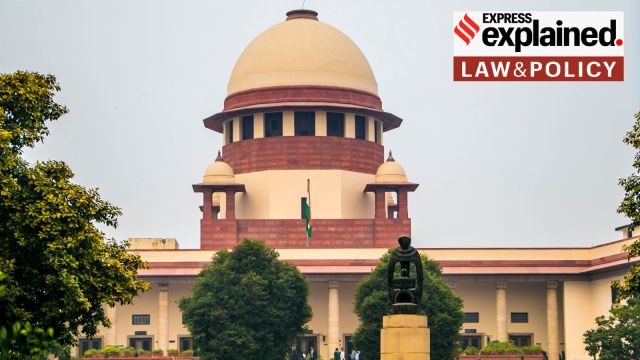Why SC held minors can reject property sale made by guardians after attaining majority
The court reaffirmed a century-old principle that a minor’s property rights can be protected through conduct demonstrating clear repudiation, not only through formal litigation.
 Once the minor, who turned major, repudiates the sale, the earlier sale is treated as void from the beginning, and no rights pass to the buyer from that sale.
Once the minor, who turned major, repudiates the sale, the earlier sale is treated as void from the beginning, and no rights pass to the buyer from that sale. In a ruling with wide implications for property transactions involving minors, the Supreme Court has held that a person, on attaining majority, can reject a property sale executed by their guardian without court approval, either by filing a suit or by conduct, such as reselling the property, within the limitation period prescribed by law.
A division bench of Justices Pankaj Mithal and Prasanna B. Varale, on October 7, stated that “it is not always necessary for a minor to institute a suit for cancellation of a voidable sale transaction executed by his guardian… such a transaction can be avoided or repudiated by his conduct.”
The court thus reaffirmed a century-old principle that a minor’s property rights can be protected through conduct demonstrating clear repudiation, not only through formal litigation.
The case before the SC
The dispute arose from two small plots in Davanagere, Karnataka, purchased in 1971 by the father in the names of his three minor sons.
Acting as their natural guardian, he sold both plots No. 56 and 57, without obtaining permission from the district court as required by law. After the sale, the ownership of Plot No. 56 was transferred to B.T. Jayadevamma, while the ownership of Plot No. 57 was transferred to K. Neelamma.
The sons, after becoming majors, sold both their plots to K.S. Shivappa. Thus, two separate disputes emerged.
In the first case regarding the purchase of Plot No. 56, Jayadevamma claimed ownership against Shivappa. The HC held in 2003 that the minor’s later sale amounted to a valid repudiation of their father’s translation. This judgment was not appealed and therefore became final.
Regarding Plot No. 57, Neelamma filed a suit in 1997 claiming ownership and seeking possession. The trial court dismissed the suit, stating that the father’s sale was voidable because no court permission had been obtained and that the minors repudiated it by selling the property after attaining legal age. It said, “the sale deed under which the predecessor-in-title of the plaintiff had purchased the aforesaid plot from the father and natural guardian of the minors was voidable as no permission of the court was taken for its sale.”
The first appellate court and the High Court reversed that decision, reasoning that since the sons had not filed a formal suit to set aside their father’s sale deed, their later sale was invalid. Recognising Neelamma as the lawful owner, the matter was appealed to the SC.
What the law says
The laws on property acquired by minors through their guardians are determined through three pieces of legislation— the Indian Contract Act 1872, the Hindu Minority and Guardianship Act, 1956, and the Guardian and Wards Act, 1890.
To enter into a valid contract, four conditions must be met. There must be consent between the parties, the transaction must have a lawful object, it must be supported by legal consideration, and the parties must be competent to contract. Of these, the competency becomes key when one of the parties is a minor represented by a guardian.
Section 11 of the Indian Contract Act states that, “Every person is competent to contract who is of the age of majority according to the law to which he is subject, and who is of sound mind, and is not disqualified from contracting by any law to which he is subject.” This places minors outside the scope of those who are competent to enter into a valid contract.
However, a contract that is entered into by a minor is considered “void ab initio” — unenforceable from the start. This is because minors’ lack of competency carves out their liability during a breach of contract. Such contracts can not be enforced by or against them in a court.
There are limited exceptions. If a minor is provided with necessities suited to their condition in life, the supplier can recover the cost of those items from the minor’s property. Contracts that are clearly for the benefit of the minor may also be upheld. A guardian may enter into contracts on behalf of a minor if the arrangement serves the minor’s interest. A minor cannot be a full partner in a business, but can receive a share of profits under a valid partnership deed.
The Hindu Minority and Guardianship Act, under Section 8, lays down the powers of a ‘natural guardian’ to act reasonably “for the benefit of the minor or for the realization, protection or benefit of the minor’s estate.” Section 8(2) bars the guardian from selling, mortgaging, gifting, or leasing the minor’s immovable property without prior permission of the court. If a transfer is made without such permission, subsection (3) makes it “voidable at the instance of the minor or any person claiming under him.”
The Guardian and Wards Act, under Section 29, reiterates the same limitation: a guardian cannot dispose of a ward’s property without the court’s sanction.
The dispute before the Supreme Court turned on how such an unauthorised sale can be challenged once the minor reaches majority. The common view has been that the now-major individual must file a suit to cancel the sale deed executed by the guardian. However, an earlier precedent from 1905, Abdul Rahman v. Sukhdayal Singh, held that, where a property was leased by a guardian not for the minor’s benefit, the court held that it was “not necessary that a suit should be instituted” and that “the act of the minor of selling the property on attaining majority is enough to repudiate the lease deed.”
This position aligns with the Limitation Act, 1963, which grants a person three years after attaining majority to set aside a property transfer made by their guardian.
What the SC said
The question before the court was whether the sale deed could be repudiated either by filing a suit or by their conduct within three years of attaining majority. The court held that a sale can be rejected by a minor in two ways: by filing a suit to cancel the transaction or by clear and “unequivocal conduct” showing that the earlier sale is not accepted.
It said, “a voidable transaction executed by the guardian of the minor can be repudiated and ignored by the minor within time on attaining majority either by instituting a suit for setting aside the voidable transaction or by repudiating the same by his unequivocal conduct.”
Once the minor, who turned major, repudiates the sale, the earlier sale is treated as void from the beginning, and no rights pass to the buyer from that sale.
In this case, the Court found that the surviving sons had, after attaining majority, executed a new sale deed in favour of K.S. Shivappa. They did so within the three-year limitation period, while their names continued to appear in the revenue records, and the earlier buyers had never taken possession. This, the Court said, was enough to show that they had rejected their father’s sale, and filing a separate suit was not necessary.
Since the plaintiff failed to appear before the court to provide evidence regarding her ownership of the plot, her case was presented through a power-of-attorney holder, who had no personal knowledge of the sale. The court noted that when a person does not appear to testify about matters within their own knowledge, another person cannot do so on their behalf. A power-of-attorney holder’s testimony, it said, is inadmissible on such personal facts. “Where the plaintiff refuses to testify, the proxies cannot substitute his personal testimony on key issues within the personal knowledge of the plaintiff. A Power-of-Attorney holder is thus, not entitled to depose in place of the principal,” the bench said.
- 01
- 02
- 03
- 04
- 05






































